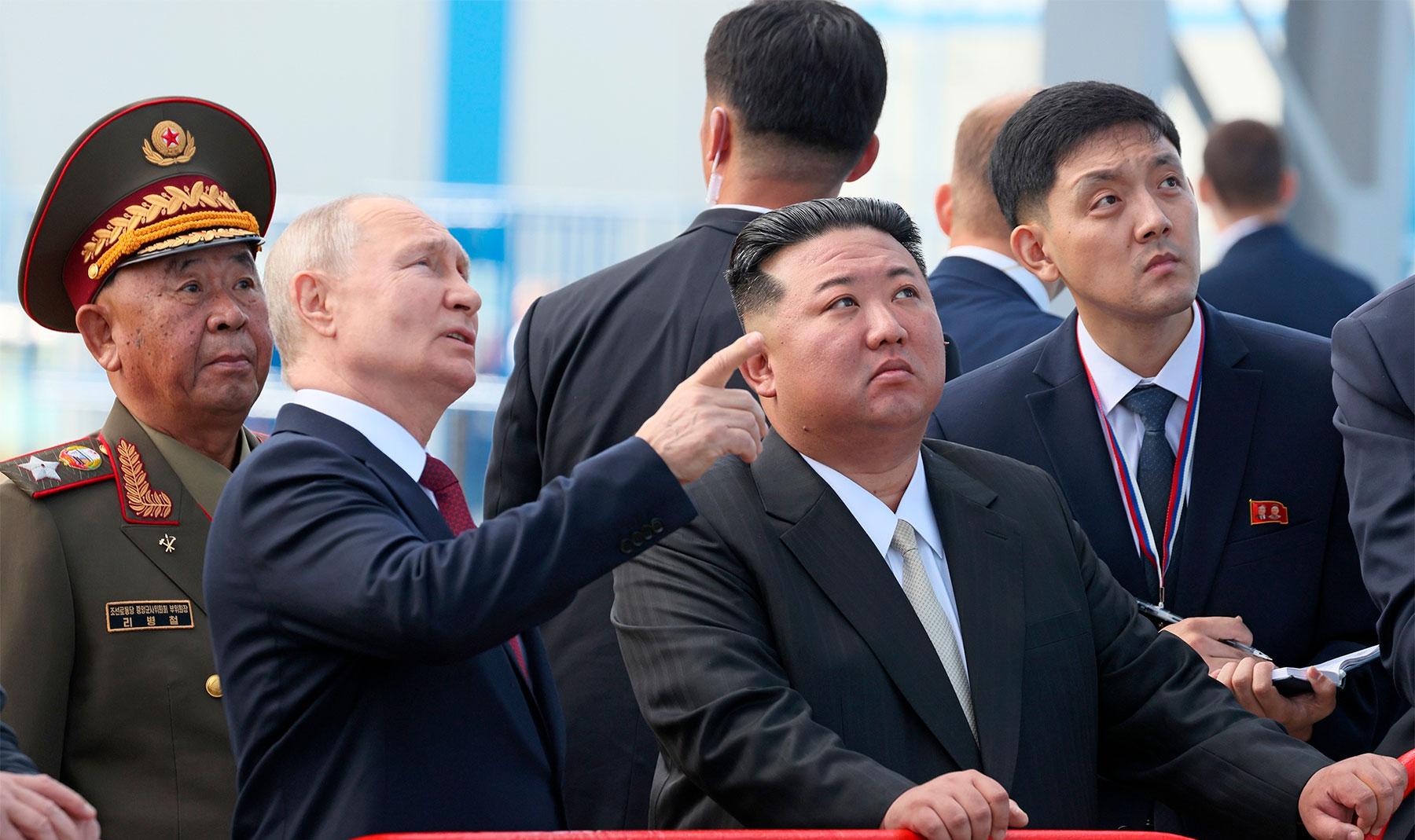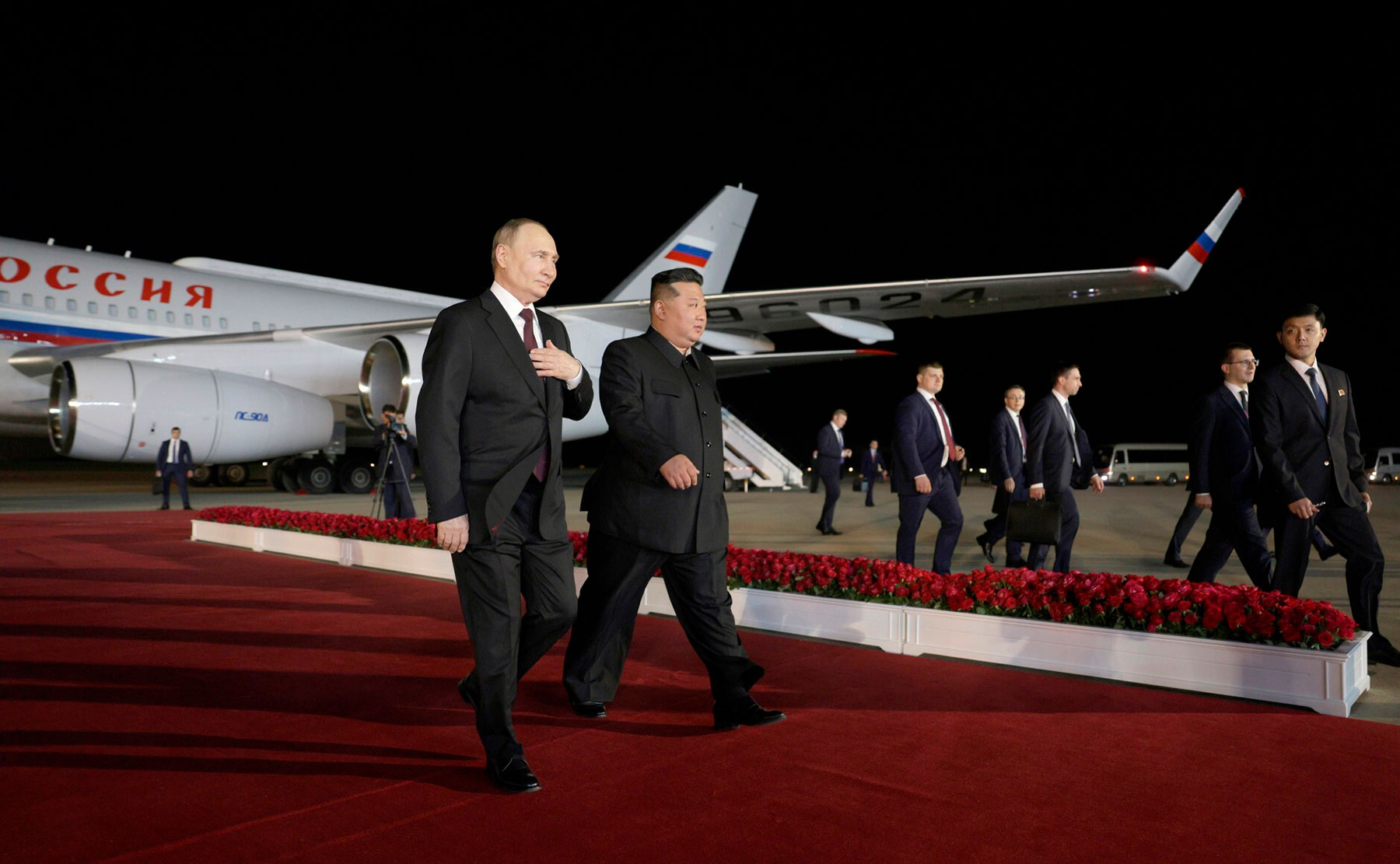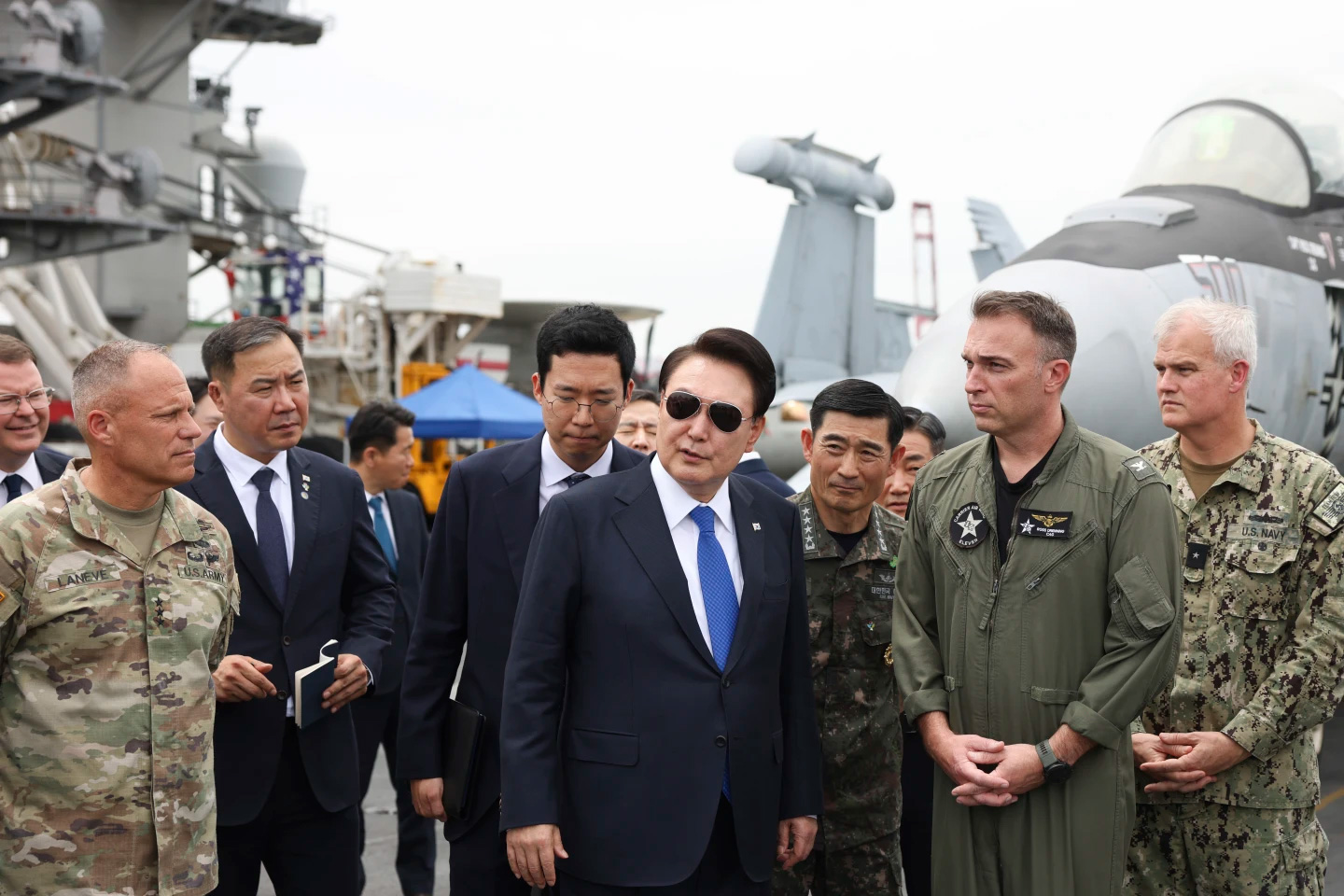After the summer visit of Vladimir Putin to North Korea cooperation between the two nations expanded in many areas. In the West they accuse the Kremlin of breaking the UN Security Council sanctions imposed on DPRK in 2011–2016, and the North Korean leadership—of supplying large amounts of the military hardware and ammunition to Moscow. Many politicians and analysts suggest that the emerging partnership between Moscow and Pyongyang creates new significant problems not only for the West or for Ukraine, but also for China: from now on Beijing will find it more difficult to exercise any political pressure on North Korea, because the latter will use its newly established links to Moscow as a tool to lessen its dependence on Beijing. Let us have a closer look at what is going on here.
First, it is evident that economic cooperation between Russia and North has been rapidly expanding over last twelve–eighteen months. That should not be surprising given the fact that DPRK remained mostly closed for international cooperation during more than three years of the COVID-19 pandemic, when the bilateral trade plummeted almost to zero. Economic cooperation between the two nations has its natural limits since the national economies of Russia and DPRK do not quite compliment each other, like, for instance, national economies of Russia and China. North Korea can offer coal, seafood, metals and other commodities that Russia itself has in abundance. A deeper industrial collaboration in machine-tool building or the IT-sector is not impossible, but it will take a lot of time to mature and to strive. Maybe in a couple of years from now we will see much more Russia-North Korea trade, but it is China that is and will continue to remain the main economic partner for DPRK.
As for the military-technical side of the cooperation, we can only guess about the real scale and the breadth of this dimension. In the Western media and academia they operate with huge numbers, which cannot be taken for granted. In reality, North Korea is a relatively small and not a particularly wealthy country, its overall 2023 defense budget amounted to less that USD 1.5 billion. Its defense production capacities are limited by definition. By comparison, only the US military assistance to Ukraine in 2022–2023 fiscal years amounted to USD 52 billion. Any North Korean supplies to Russia would look just a drop in the bucket.
Addressing the nuclear problem on the Korean Peninsula, one has to keep in mind that peace is more important than the nuclear disarmament of North Korea. An inadvertent conflict could arise from accidental clashes between North Korean and South Korean soldiers in the Demilitarized Zone. Consequently, various confidence-building measures on the Korean Peninsula would help overcome the crisis, including the exchange of information, observer visits, military contacts, etc. Among other things, such confidence-building measures would gradually involve cooperation on the part of Pyongyang’s military elite, as sustainable peace on the peninsula is unlikely without it.
On a more general note, we can take it as given that relations with Pyongyang are and will continue to be one of the topics to be discussed in detail between Russia and China. It is clear that Moscow would abstain from any steps in its relations with Pyongyang that could even in theory jeopardize legitimate Beijing’s interests in the region and beyond. Still, even working hand in hand with each other, Russia and China are not in a position to impose their will on DPRK—the North Korean nation has paid such a high price for its independence that it will never consider becoming a junior partner of either Moscow or Beijing. This attitude is deeply rooted in the very nature of the North Korean state and it is not likely to change in any foreseeable future.
On October 14, President of Russia Vladimir Putin submitted to the State Duma a draft law on ratifying the Treaty on Comprehensive Strategic Partnership between the Russian Federation and the DPRK, signed on June 19 during his last trip to this country. The Treaty was ratified On October 24. The Russian Foreign Ministry issued a special statement, arguing that “the treaty outlines the basic principles for developing Russian-Korean ties, aimed at deepening our partnership and strategic cooperation across a wide range of areas prioritized by both states and fostering a just international system. It is important to emphasize that the document has a non-confrontational nature, is not aimed against third countries’ interests, and is oriented towards maintaining stability in Northeast Asia”.
At about the same time, the Western media leaked news about North Korean special forces spotted in the Kursk region close to the Russian-Ukrainian line of contact. Allegedly, about ten thousand uniformed men from North Korea are ready to join Russian troops in their efforts to oust the Ukrainian army from the occupied Russian territories. Some experts argue that instead of a direct military engagement Koreans are going to study the fresh Russian combat experience on the ground. So far, neither Moscow, nor Pyongyang have officially confirmed or denied these statements and speculations. At the recent BRICS Summit in Kazan President Vladimir Putin limited himself to stating that Article 4 of the Treaty allows the sides to render each other military assistance in case of a foreign attack. Finally, in the end of October DPRK launched a new intercontinental ballistic missile (ICBM) towards waters off its eastern coast in what was the longest flight time yet for a North Korean missile raising Western fears of a new stage in advanced weapons development by Pyongyang.
The hot news contributed to an ongoing discussion around the growing Moscow—Pyongyang ties. After the summer visit of Vladimir Putin to North Korea cooperation between the two nations expanded in many areas. In the West they accuse the Kremlin of breaking the UN Security Council sanctions imposed on DPRK in 2011–2016, and the North Korean leadership—of supplying large amounts of the military hardware and ammunition to Moscow. Many politicians and analysts suggest that the emerging partnership between Moscow and Pyongyang creates new significant problems not only for the West or for Ukraine, but also for China: from now on Beijing will find it more difficult to exercise any political pressure on North Korea, because the latter will use its newly established links to Moscow as a tool to lessen its dependence on Beijing.
Let us have a closer look at what is going on here.
First, it is evident that economic cooperation between Russia and North has been rapidly expanding over last twelve–eighteen months. That should not be surprising given the fact that DPRK remained mostly closed for international cooperation during more than three years of the COVID-19 pandemic, when the bilateral trade plummeted almost to zero. Now Moscow is trying to catch up, but though the trade indeed grows quite fast in relative terms, it still remains modest in absolute terms: in 2023 it amounted to only $ 35 million, and this year it may reach USD 50 million or sightly more than that. Economic cooperation between the two nations has its natural limits since the national economies of Russia and DPRK do not quite compliment each other, like, for instance, national economies of Russia and China. North Korea can offer coal, seafood, metals and other commodities that Russia itself has in abundance. A deeper industrial collaboration in machine-tool building or the IT-sector is not impossible, but it will take a lot of time to mature and to strive.
Maybe in a couple of years from now we will see much more Russia-North Korea trade, but it is China that is and will continue to remain the main economic partner for DPRK. One should add that in case of DPRK, international trade has never been converted into a foreign political influence—neither Russia, nor even China can claim that it calls the shots in Pyongyang. National sovereignty and independence have always been top priorities for the North Korean leadership, any this is not likely to change no matter how hard life in North Korea is going to be.
As for the military-technical side of the cooperation, we can only guess about the real scale and the breadth of this dimension. In the Western media and academia they operate with huge numbers, which cannot be taken for granted. Given everything we know about North Korea, it appears that all the speculations about ‘massive military assistance’ allegedly provided by NK to Russia are blown out of any reasonable proportion. In reality, North Korea is a relatively small and not a particularly wealthy country, its overall 2023 defense budget amounted to less that USD 1.5 billion. Its defense production capacities are limited by definition. By comparison, only the US military assistance to Ukraine in 2022–2023 fiscal years amounted to USD 52 billion. Any North Korean supplies to Russia would look just a drop in the bucket.
Then, what about a direct North Korean involvement into the Russian-Ukrainian conflict? Could it become a game-changer, leading to an inevitable escalation with the danger of a global war becoming more real? Right now we do not now whether plans for a direct North Korean military engagement into the Russian-Ukrainian conflict do exist or not and if the answer is yes then what specific missions they might be assigned to. Yet, there are two things that we do know pretty well. First, the conflict has already involved thousands of expats from literally all corners of the world, mostly on the Ukrainian side. According to Western sources, since the beginning of the conflict more than thirteen thousand soldiers of fortune have joined the Ukrainian army. Second, it is also clear that even ten or thirteen thousand of highly trained, well equipped and properly motivated servicemen would not radically change the momentum of the conflict, in which many hundreds of thousands are engaged from each of the two sides.
It would also be highly unlikely to expect Moscow, even with the new Treaty in place, to deliberately help boosting North Korean nuclear or ballistic programs or to radically change Russia’s long-established positions on denuclearization of the Korean peninsula. Nuclear proliferation in any form and in any place in the world cannot meet Russia’s strategic interests. At the same time, in the Kremlin they have to stay realistic about what is possible and what is not at this point. A year ago Kim Jong Un initiated changes to the DPRK Constitution explicitly emphasizing the indispensable role of nuclear weapons as a means of “national survival”. The ongoing security changes in North-East Asia initiated by the United States, Japan and South Korea do not incentivize Pyongyang to start moving in the direction of nuclear disarmament.
Addressing the nuclear problem on the Korean Peninsula, one has to keep in mind that peace is more important than the nuclear disarmament of North Korea. An inadvertent conflict could arise from accidental clashes between North Korean and South Korean soldiers in the Demilitarized Zone. Consequently, various confidence-building measures on the Korean Peninsula would help overcome the crisis, including the exchange of information, observer visits, military contacts, etc. Among other things, such confidence-building measures would gradually involve cooperation on the part of Pyongyang’s military elite, as sustainable peace on the peninsula is unlikely without it.
Furthermore, a complete rejection of Pyongyang as a full-fledged member of the “nuclear club” does not necessarily mean a similar refusal to negotiate with North Korea as a de-facto nuclear power. The goal of turning the Korean Peninsula into a nuclear-free zone does not need to be taken off the agenda; however, one should take it as a long-term objective, and it could take several decades to come to a solution. It is also important to understand that even very modest steps in this direction will significantly contribute to the stabilizing the situation on the peninsula. The “all or nothing” approach needs to be abandoned because the international community is not in a position to give an ultimatum to Pyongyang.
Is Russia going to abruptly walk out of the UN Security Council approved sanctions regime against North Korea like the United States walked out of the UN approved Joint Comprehensive Plan of Action (JCPOA), also known as the "Iran nuclear deal" or the "Iran deal", in May of 2018? In my view, this option is hard to imagine since it would set a dangerous precedent and would raise more doubts in the future of the United Nations. Besides, it seems that in the Russian leadership they have not completely abandoned hopes for a future rapprochement with South Korea, which will also serve as mitigating factor making radical shifts in Russia’s positions on North Korea less probable. More likely, Moscow is going to push for UN SC decisions that could ease the already imposed UN sanctions and also to oppose any new sanctions’ proposals that can come from the United States and its Western allies. The odds are that announcing any new Russia’s initiatives on North Korea within the United Nations will be preceded by appropriate Russia-China consultations and followed by a Moscow-Beijing solidarity vote.
On a more general note, we can take it as given that relations with Pyongyang are and will continue to be one of the topics to be discussed in detail between Russia and China. It is clear that Moscow would abstain from any steps in its relations with Pyongyang that could even in theory jeopardize legitimate Beijing’s interests in the region and beyond. Still, even working hand in hand with each other, Russia and China are not in a position to impose their will on DPRK—the North Korean nation has paid such a high price for its independence that it will never consider becoming a junior partner of either Moscow or Beijing. This attitude is deeply rooted in the very nature of the North Korean state and it is not likely to change in any foreseeable future.
First published in the Guancha.cn.







